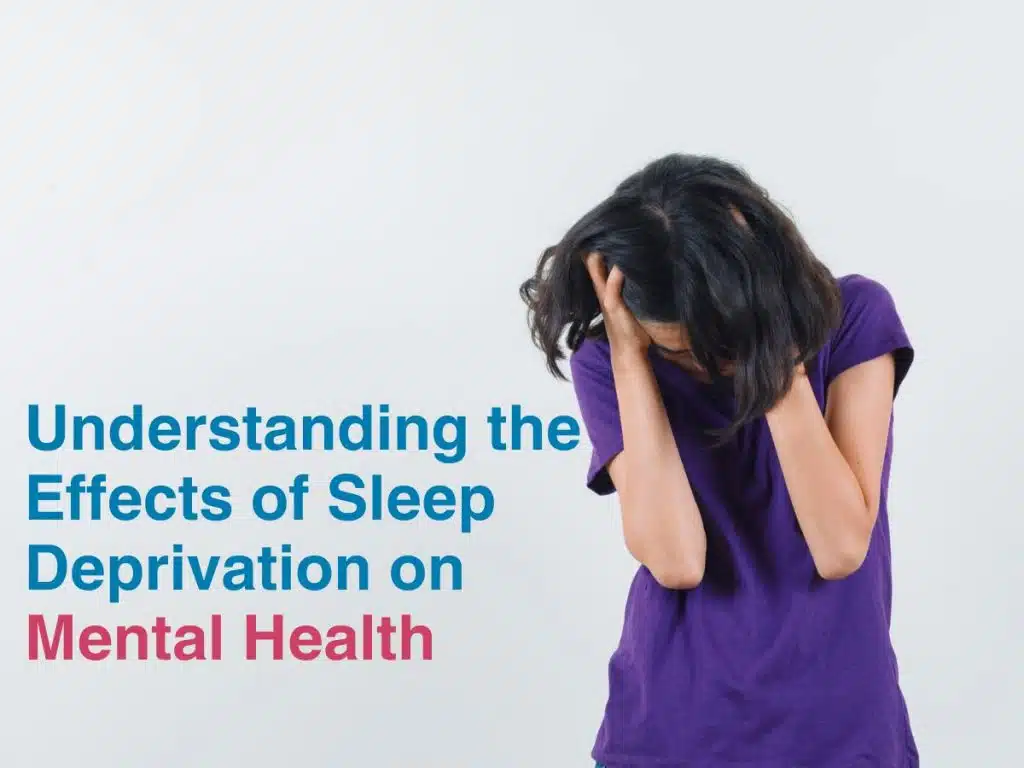Sleep is a basic human need, just like food and water. When your sleep suffers, everything from your mood to your physical health can feel the effects. While everyone has an occasional restless night, an ongoing lack of sleep can profoundly influence your mental and physical wellness. Understanding how sleep deprivation, mental health, and physical health are connected can empower you to make informed choices about your well-being. Here’s information on what sleep deprivation is, and how it can impact mental health conditions, like depression, and physical health conditions, like obesity:
What Is Sleep Deprivation?
Sleep deprivation occurs when you consistently do not get enough sleep to feel rested and alert. Adults typically require seven to nine hours of sleep per night, but individual needs do vary. Sleep deprivation doesn’t just refer to missing an entire night of rest. It can also mean getting too little sleep over several days or weeks.
Factors leading to sleep deprivation include demanding work schedules, stress, health conditions like obesity, and habits such as excessive screen time before bed. Over time, the body and mind tire and signal that something is wrong. Common signs of sleep deprivation include difficulty concentrating, forgetfulness, irritability, and feeling constantly tired, even when sleep routines improve.
How Can Sleep Deprivation Impact Mental Health?
While occasional lack of sleep may leave you tired or unfocused, ongoing sleep deprivation amplifies these effects. For some, persistent lack of sleep is associated with increased feelings of anxiety and sadness. Concentration becomes more difficult, decision-making slows, and emotional regulation is more complex to balance.
Sleep plays a key role in emotional processing and memory. When your body misses out on restorative rest, it becomes challenging to cope with daily stress. Over time, tasks that once felt easy may seem overwhelming. The relationship is two-way. Poor mental health commonly contributes to disrupted sleep, creating a cycle that may be hard to break. Seeking guidance from a health professional is recommended for anyone experiencing significant changes in mood or sleep habits.
How Can Sleep Deprivation Impact Physical Health?
Not getting enough sleep doesn’t just influence your mind, but it also affects your entire body. Chronic sleep deprivation has been linked to a range of potential health challenges. Your immune system, metabolism, and even your heart may be impacted. The body uses sleep to repair cells, support growth, and balance hormones.
Obesity
Research has shown a connection between inadequate sleep and weight gain, sometimes causing or adding to the causes of obesity. When you don’t get enough restorative rest, the body’s hunger-regulating hormones, such as leptin and ghrelin, can become unbalanced. This imbalance may lead to increased feelings of hunger and a preference for high-calorie foods. Fatigue also reduces the motivation to exercise or prepare healthy meals. These patterns may contribute to gradual weight gain over time.
What Does It Mean To Be Obese?
Obesity refers to having a body mass index (BMI) of 30 or higher. It is a complex condition involving excessive body fat that increases the risk of health problems such as diabetes, heart disease, and certain cancers. Factors like genetics, lifestyle, and environment all contribute. When sleep deprivation becomes a regular pattern, it can disrupt the body’s natural processes for regulating appetite and metabolism, which are fundamental for maintaining a healthy weight.
Learn More About How Obesity, Mental Health, and Sleep Deprivation Connect
Getting consistent, restful sleep supports both mental and physical health. The connection between sleep deprivation and issues like mood changes or weight gain highlights the significance of making sleep a wellness priority. If you are experiencing sleep difficulties or changes in your mental health, contemplate speaking with a healthcare provider today.
- mylovelyfurryfriend discover expert tips on dog health
- Infectious Diseases Updates – Stay Informed, Stay Protected!
- Wegovy For Weight Loss – A Breakthrough in Managing Obesity!
- Emergency Medicine Forum – A Hub for Fast-Paced Knowledge, Support & Updates!
- Pediatrics Discussions – Insights, Challenges, and Expert Advice for Better Child Health!





Leave a Reply